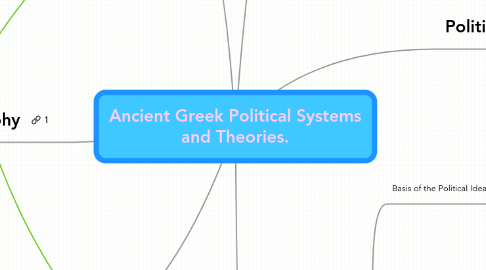
1. Aristocracy & Oligarchy
1.1. Basis of the Political Idea
1.2. History of the Idea
1.2.1. origin of the name
1.2.2. tyrannical tendencies
1.3. Transition of Rulers
1.3.1. Most Important / Remebered
1.3.1.1. First Known Oligarchy
1.3.1.2. Wars and Remodeling
1.3.2. Transition to Tyranny
1.4. Success of the Idea
1.5. Thirty Tyrants
2. Tyranny
2.1. Basis of the Political Idea
2.2. History of the Idea
2.2.1. origin of the name
2.3. Transitions of Rulers
2.3.1. Most Important / Remembered
2.3.1.1. Aisymnetes
2.3.1.2. Hellenic Tyrants
2.3.1.3. Populism
2.3.1.4. Sicilian Tyrants
2.3.2. First Known Tyranny
2.3.3. Thirty Tyrants
2.4. Success of the Idea
3. Bibliography
4. Monarchy
4.1. Basis of the Political Idea
4.2. Transitions of Rulers
4.2.1. Most Important / Remembered
4.2.1.1. First Known Monarchy
4.2.1.2. End of Monarchy on Ancient Greece
4.3. Success of the Idea
4.3.1. Success of the Government
4.3.2. Views of Commoners
4.3.3. Country/City Layout
4.4. History of the Idea
5. Democracy
5.1. Basis of the Political Idea
5.1.1. Council
5.1.2. Law and Code
5.1.3. Dividing Populations into Groups
5.1.4. Allotment
5.1.5. Assembly
5.2. History of the Idea
5.2.1. Athenian Constitution
5.2.2. Athenian Democracy
5.2.2.1. Weaknesses
5.2.2.1.1. Pace
5.2.2.1.2. Assembly Participation
5.2.2.2. Advantages
5.2.2.2.1. Annual Elections
5.2.2.2.2. Chance to Take Part in the Process
5.3. Transition of Rulers
5.3.1. First Known Democracy
5.3.2. Most Important / Remembered
5.3.2.1. Father of Democracy
5.3.2.2. Cleisthenes
5.3.2.2.1. Cleisthenes's Reforms
5.3.2.3. Pericles
5.4. Success of the Idea
5.4.1. Middle / Lower Class Benefits
6. Political Writings
6.1. Plato
6.1.1. basic idea of writings
6.1.1.1. "Philosopher Kings"
6.1.1.2. weakness
6.1.1.3. Connecting City to Humans
6.1.1.4. Transitions of Governments
6.1.2. The Republic
6.1.3. Relationship with Socretes
6.2. Aristotle
6.2.1. basic idea of writings
6.2.1.1. State "Households" Relationships
6.2.1.1.1. Master to Slave
6.2.1.1.2. Husband and Wife
6.2.1.1.3. Father to Child
6.2.2. Politics
